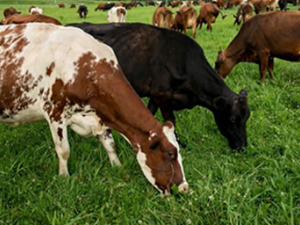
In an era when farmers have been told to go big or get out, Wisconsin dairy farmers have found a way to make farms more profitable and more sustainable through managed rotational grazing. A newly formed collaborative group based at the University of Wisconsin–Madison is working to create more opportunities for grazing and other types of perennial grassland farming.
This new initiative, funded by a $10 million Agriculture and Food Research Initiative grant from USDA’s National Institute of Food and Agriculture, is called Grassland 2.0 and is a nod to the prairies that once dominated the landscape. The collaboration brings together farmers, researchers, food processors, and government officials to find new opportunities for grazing and other perennial grassland farming practices.
The benefits of grass-based systems extend beyond farms. Well-managed grasslands can reduce soil erosion and nutrient runoff, sequester carbon, increase water retention, reduce flooding, and support wildlife, all while providing an income source for farmers. For more information, read the UW-Madison news article.

